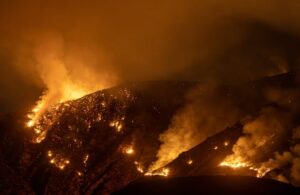Physical Address
23,24,25 & 26, 2nd Floor, Software Technology Park India, Opp: Garware Stadium,MIDC, Chikalthana, Aurangabad, Maharashtra – 431001 India
Physical Address
23,24,25 & 26, 2nd Floor, Software Technology Park India, Opp: Garware Stadium,MIDC, Chikalthana, Aurangabad, Maharashtra – 431001 India

A viral Instagram post from @gubbahomestead, boasting over 551,000 likes and 25.5k comments, boldly claims: ‘There’s no way the wildfires in Los Angeles are due to climate change.’ The statement has sparked heated debates across social media, fueling both skepticism and curiosity.

Climate change has led to increased temperatures and prolonged droughts, creating conditions conducive to wildfires. Warmer climates result in drier vegetation, which serves as fuel for fires. The 2023 Canadian wildfires, for instance, were exacerbated by higher temperatures and drier conditions linked to climate change.
Claim 1: Climate change is not responsible for wildfires in LA.
Fact: Climate change does not directly ignite wildfires but creates conditions that increase their likelihood and intensity.
Rising global temperatures have led to prolonged droughts, drier vegetation, and frequent heatwaves, making landscapes more susceptible to ignition and rapid fire spread. For example, a 2020 study published in Nature Communications showed that climate change has doubled the number of extreme fire weather days globally since 1980.
Factors like lightning strikes, electrical equipment failures, or careless human actions such as campfires or discarded cigarettes can cause multiple ignitions over a short period. According to the U.S. National Interagency Fire Center (NIFC), nearly 85% of wildfires in the U.S. are human-caused, while the rest are attributed to natural phenomena like lightning.
Research indicates that climate change is creating warmer, drier conditions, leading to longer and more intense fire seasons. Human-induced climate change has driven higher temperatures and increased atmospheric thirst, resulting in greater aridity of forest fuels during fire seasons. Studies show that these factors were responsible for over half of the observed decline in fuel moisture in western U.S. forests between 1979 and 2015, as well as a doubling of forest fire-burned areas from 1984 to 2015.
In much of the U.S. West, projections suggest that a 1°C increase in average annual temperature could boost the median burned area per year by up to 600% in certain forest types. Similarly, in the Southeastern United States, models predict increased fire risk, an extended fire season, and at least a 30% rise in the area burned by lightning-ignited wildfires by 2060 compared to 2011 levels.
This claim underscores that climate change and human activity are the primary drivers behind the conditions that lead to wildfires, not conspiracies.
Claim 2: Insurance companies canceling policies in high-risk wildfire areas is a calculated response to financial risks, not coincidence or conspiracy.
Fact 2: Insurance companies base their decisions on risk assessments, which have shown increasing losses due to wildfires. For example, the Insurance Information Institute (III) report highlights that U.S. insured losses from wildfires exceeded $13 billion in 2017 and 2018 combined.
To mitigate financial exposure, insurers often reduce coverage in areas deemed high-risk. In California, for instance, several major insurers have either raised premiums or stopped issuing new policies in wildfire-prone regions. This trend aligns with escalating wildfire damages, as the frequency and severity of wildfires have grown due to climate change and urban development encroaching into fire-prone areas.
This phenomenon reflects risk management rather than conspiracy, as insurers adapt to a changing risk landscape to remain financially viable.
References:
https://www.noaa.gov/noaa-wildfire/wildfire-climate-connection
https://science2017.globalchange.gov/chapter/8
https://www.iii.org/fact-statistic/facts-statistics-global-catastrophes
Banner Image: Photo by Soly Moses
https://www.pexels.com/photo/dramatic-nighttime-forest-fire-in-california-28317514
Comments are closed.
Самый быстрый и безопасный сервис обмена электронных денег ждет вас на [url=https://www.bestchange.ru/?p=1305667]BestChange.ru[/url]. Если вы фрилансер, веб-мастер, получаете деньги за услуги и постоянно имеете дело с электронной валютой в сети, то пользоваться традиционными сервисами не всегда удобно. Гораздо приятнее иметь дело с обменными пунктами, где меньше ограничений, лучше курсовая разница, скидки на тарифы для постоянных клиентов. Согласны? На BestChange представлены именно такие обменные пункты, «заточенные» под завсегдатаев Интернета, обладающие безупречной репутацией, решающие любые вопросы на раз-два-три.
Проходите по ссылке — более 500 проверенных обменных онлайн-сервисов в одном месте — [url=https://www.bestchange.ru/?p=1305667]BestChange.ru[/url]
https://continent-telecom.com/virtual-number-uk
Откройте для себя bs2site at возможности даркнет-рынка с тысячами предложений. Быстрая регистрация, надежные сделки и анонимность на каждом этапе.
Лучшее онлайн казино https://1wincasino.pl Огромный выбор автоматов, настольных игр и live-казино. Уникальные акции, приветственные бонусы и мгновенные выплаты сделают вашу игру еще интереснее.
текст песни воин https://faav.ru
как правильно охотиться обучение охоте
Также рекомендую вам почитать по теме – безопасный скрипт обменника электронных валют